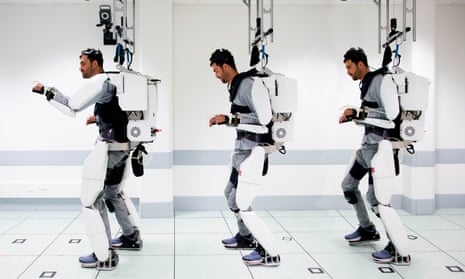A French man paralysed in a nightclub accident has walked again thanks to a brain-controlled exoskeleton, providing hope to tetraplegics seeking to regain movement.
The patient trained for months, harnessing his brain signals to control a computer-simulated avatar to perform basic movements before using the robot device to walk. Scientists described the trial results as a breakthrough.
Doctors who conducted the trial said though the device was years away from being publicly available, it had the potential to improve patients’ quality of life and autonomy.
The patient, identified only as Thibault, 28, from Lyon, said the technology had given him a new lease of life. Four years ago his life was permanently changed when he fell 40ft (12 metres) from a balcony, severing his spinal cord and leaving him paralysed from the shoulders down.
“When you are in my position, when you can’t do anything with your body … I wanted to do something with my brain,” Thibault said.
He trained using a video game avatar system to acquire the skills needed to operate the exoskeleton and had to relearn natural movements from scratch. “I can’t go home tomorrow in my exoskeleton but I’ve got to a point where I can walk. I walk when I want and I stop when I want,” Thibault said.
Cervical spinal cord injuries leave about 20% of patients paralysed in all four limbs and is the most severe injury of its kind.
Alim Louis Benabid, professor emeritus at Grenoble and lead author of the study published in the Lancet Neurology journal, said: “The brain is still capable of generating commands that would normally move the arms and legs, there’s just nothing to carry them out.”
A team of experts from Grenoble Alpes hospital, the biomedical company Cinatech and the CEA research centre began the procedure by implanting two recording devices either side of Thibault’s head, between the brain and the skin. These read his sensorimotor cortex, which controls motor function.
Each decoder transmits brain signals, which are translated by an algorithm into the movements the patient has thought about. It is this system that sends the physical commands the exoskeleton executes.
Thibault used the avatar and video game to think about performing physical tasks such as walking and reaching out to touch objects. Using the avatar, video game and exoskeleton combined, he was able to cover the length of one and a half football pitches over the course of many sessions.
Several studies have used implants to stimulate patients’ muscles but the Grenoble research is the first to use brain signals to control a robot exoskeleton.
Experts involved in the study said it could potentially lead to brain-controlled wheelchairs for paralysed patients. “This isn’t about turning man into machine but about responding to a medical problem,” said Benabid. “We’re talking about ‘repaired man’, not ‘augmented man’.”
In a comment piece on the study, Tom Shakespeare, professor of disability research at the London School of Hygiene and Tropical Medicine, said the exoskeleton system was a long way from usable clinical possibility.
But Thibault said the trial offered a “message of hope to people like me … This is possible, even with our handicap.”










